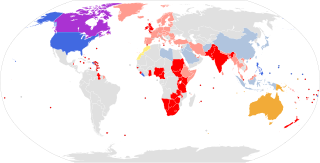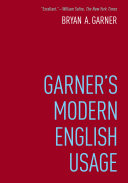Related Research Articles

Gibberish, also called jibber-jabber or gobbledygook, is speech that is nonsense: ranging across speech sounds that are not actual words, pseudowords, language games and specialized jargon that seems nonsensical to outsiders.
Singular they, along with its inflected or derivative forms, them, their, theirs, and themselves, is a gender-neutral third-person pronoun. It typically occurs with an indeterminate antecedent, in sentences such as:

A Dictionary of Modern English Usage (1926), by Henry Watson Fowler (1858–1933), is a style guide to British English usage, pronunciation, and writing. Covering topics such as plurals and literary technique, distinctions among like words, and the use of foreign terms, the dictionary became the standard for other style guides to writing in English. Hence, the 1926 first edition remains in print, along with the 1965 second edition, edited by Ernest Gowers, which was reprinted in 1983 and 1987. The 1996 third edition was re-titled as The New Fowler's Modern English Usage, and revised in 2004, was mostly rewritten by Robert W. Burchfield, as a usage dictionary that incorporated corpus linguistics data; and the 2015 fourth edition, revised and re-titled Fowler's Dictionary of Modern English Usage, was edited by Jeremy Butterfield, as a usage dictionary. Informally, readers refer to the style guide and dictionary as Fowler's Modern English Usage, Fowler, and Fowler's.
In grammar, a conjunction is a part of speech that connects words, phrases, or clauses that are called the conjuncts of the conjunctions. That definition may overlap with that of other parts of speech, and so what constitutes a "conjunction" must be defined for each language. In English, a given word may have several senses, and be either a preposition or a conjunction depending on the syntax of the sentence. For example, after is a preposition in "he left after the fight" but is a conjunction in "he left after they fought". In general, a conjunction is an invariable (non-inflected) grammatical particle that may or may not stand between the items conjoined.
And/or is an English grammatical conjunction used to indicate that one or more of the cases it connects may occur. It is used as an inclusive or, because saying "or" in spoken language might be inclusive or exclusive.
Elegant variation is the use of synonyms to avoid repetition or add variety. The term was introduced in 1906 by H. W. Fowler and F. G. Fowler in The King's English. In their meaning of the term, they focus particularly on instances when the word being avoided is a noun or its pronoun. Pronouns are themselves variations intended to avoid awkward repetition, and variations are so often necessary, that they should be used only when needed. The Fowlers recommend that "variations should take place only when there is some awkwardness, such as ambiguity or noticeable monotony, in the word avoided".
The usage of a language is the ways in which its written and spoken variations are routinely employed by its speakers; that is, it refers to "the collective habits of a language's native speakers", as opposed to idealized models of how a language works or in the abstract. For instance, Fowler characterized usage as "the way in which a word or phrase is normally and correctly used" and as the "points of grammar, syntax, style, and the choice of words." In everyday usage, language is used differently, depending on the situation and individual. Individual language users can shape language structures and language usage based on their community.
In English-language punctuation, a serial comma is a comma placed immediately after the penultimate term in a series of three or more terms. For example, a list of three countries might be punctuated as either "France, Italy and Spain" or "France, Italy, and Spain".
In written English usage, a comma splice or comma fault is the use of a comma to join two independent clauses. For example:
It is nearly half past five, we cannot reach town before dark.

Despite the various English dialects spoken from country to country and within different regions of the same country, there are only slight regional variations in English orthography, the two most notable variations being British and American spelling. Many of the differences between American and British/Commonwealth English date back to a time before spelling standards were developed. For instance, some spellings seen as "American" today were once commonly used in Britain, and some spellings seen as "British" were once commonly used in the United States.
The Latin adverb sic inserted after a quoted word or passage indicates that the quoted matter has been transcribed or translated exactly as found in the source text, complete with any erroneous, archaic, or otherwise nonstandard spelling, punctuation, or grammar. It also applies to any surprising assertion, faulty reasoning, or other matter that might be interpreted as an error of transcription.

Garner's Modern English Usage (GMEU), written by Bryan A. Garner and published by Oxford University Press, is a usage dictionary and style guide for contemporary Modern English. It was first published in 1998 as A Dictionary of Modern American Usage, with a focus on American English, which it retained for the next two editions as Garner's Modern American Usage (GMAU). It was expanded to cover English more broadly in the 2016 fourth edition, under the present title. The work covers issues of usage, pronunciation, and style, from distinctions among commonly confused words and phrases to notes on how to prevent verbosity and obscurity. In addition, it contains essays about the English language. An abridged version of the first edition was also published as The Oxford Dictionary of American Usage and Style in 2000 and a similar version was published in The Chicago Manual of Style 16th edition in 2017. The latter includes three sections titled "Grammar", "Syntax" and "Word Usage", each with several subcategories.

No worries is an expression seen in English meaning "do not worry about that", "that's all right", "forget about it" or "sure thing". It is similar to the American English "no problem". The phrase is widely used in Australian and New Zealand speech and represents a feeling of friendliness, good humour, optimism and "mateship" in Australian culture. The phrase has been referred to as the national motto of Australia.
A false, coined, fake, bogus or pseudo-title, also called a Time-style adjective and an anarthrous nominal premodifier, is a kind of appositive phrase before a noun predominantly found in journalistic writing. It formally resembles a title, in that it does not start with an article, but is a common noun phrase, not a title. An example is the phrase convicted bomber in "convicted bomber Timothy McVeigh", rather than "the convicted bomber Timothy McVeigh".
Corporate jargon is the jargon often used in large corporations, bureaucracies, and similar workplaces. The language register of the term is generally being presented in a negative light or disapprovingly. It is often considered to be needlessly obscure or, alternatively, used to disguise an absence of information. Its use in corporations and other large organisations has been widely noted in media.

This list comprises widespread modern beliefs about English language usage that are documented by a reliable source to be misconceptions.
Verbosity, or verboseness, is speech or writing that uses more words than necessary. The opposite of verbosity is plain language.

The inanimate whose refers to the use in English of the relative pronoun whose with non-personal antecedents, as in: "That's the car whose alarm keeps waking us up at night." The construction is also known as the whose inanimate, non-personal whose, and neuter whose.
An expletive is a word or phrase inserted into a sentence that is not needed to express the basic meaning of the sentence. It is regarded as semantically null or a placeholder. Expletives are not insignificant or meaningless in all senses; they may be used to give emphasis or tone, to contribute to the meter in verse, or to indicate tense.
References
- 1 2 Olivia Stockard (8 June 2011). The Write Approach: Techniques for Effective Business Writing. Emerald Group Publishing. p. 62. ISBN 978-0-85724-831-2 . Retrieved 29 August 2012.
- 1 2 V.S. Gupta (1 January 2003). Handbook Of Reporting And Communication Skills. Concept Publishing Company. p. 8. ISBN 978-81-8069-043-3 . Retrieved 29 August 2012.
- 1 2 3 4 5 6 7 Bryan A. Garner; Ruth Bader Ginsburg (31 March 2009). "Genteelisms, Officialese, and Commercialese". Garner on Language and Writing . American Bar Association. pp. 88–94. ISBN 978-1-60442-445-4 . Retrieved 29 August 2012.
- 1 2 Bryan A. Garner (17 May 2001). A Dictionary of Modern Legal Usage . Oxford University Press. p. 615. ISBN 978-0-19-514236-5 . Retrieved 29 August 2012.
- ↑ Bryan A. Garner (28 July 2009). "Formal Words". Garner's Modern American Usage (3rd ed.). Oxford University Press. pp. 370–71. ISBN 978-0-19-987462-0 . Retrieved 21 March 2013.
- ↑ J. Renkema (2004). Introduction to Discourse Studies. John Benjamins Publishing. p. 152. ISBN 978-1-58811-530-0 . Retrieved 29 August 2012.
- 1 2 Steven Roger Fischer (3 October 2004). History of Language. Reaktion Books. p. 193. ISBN 978-1-86189-080-1 . Retrieved 29 August 2012.
- ↑ Barbara Czarniawska (15 April 1997). Narrating the Organization: Dramas of Institutional Identity. University of Chicago Press. p. 152. ISBN 978-0-226-13229-7 . Retrieved 29 August 2012.
- ↑ Talke Klara Hoppmann (18 March 2010). Citizen Perceptions of the European Union: The Impact of the Eu Web Site. Cambria Press. p. 411. ISBN 978-1-60497-675-5 . Retrieved 29 August 2012.
- 1 2 Martin Manser (28 August 2011). Good Word Guide: The fast way to correct English - spelling, punctuation, grammar and usage. A&C Black. p. 451. ISBN 978-1-4081-2332-4 . Retrieved 29 August 2012.
- ↑ Christopher Williams (30 June 2007). Tradition and Change in Legal English: Verbal Constructions in Prescriptive Texts. Peter Lang. p. 177. ISBN 978-3-03911-444-3 . Retrieved 29 August 2012.